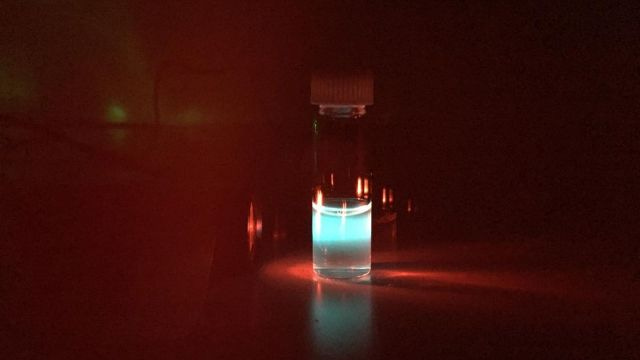Issue #221 - DARPA sends robots underground; nanoparticles will give you night vision; why AI needs a body; Chinese firm clones a cat; and more!
View this email in your browser
This week - DARPA sends robots underground; nanoparticles will give you night vision; why AI needs a body; Chinese firm clones a cat; and more!
MORE THAN A HUMAN
Nanoparticles Will Give You Superhuman Night Vision

Scientists have successfully used nanoparticles to allow mice to see near-infrared light. The researchers say they've made progress on similar nanoparticles to confer this ability onto humans, letting people see in the dark in the future. The nanomaterial in the eyes of the mice did not cause any notable side effects.
Cyborgs will replace humans and remake the world
“Our supremacy as the prime understanders of the cosmos is rapidly coming to end,” writes James Lovelock, British environmentalist and futurist, in the book, "Novacene." “The understanders of the future will not be humans but what I choose to call ‘cyborgs’ that will have designed and built themselves.”
ARTIFICIAL INTELLIGENCE
The body is the missing link for truly intelligent machines

Some researchers believe they can create intelligent machines by trying to recreate the human mind while bypassing the messy flesh that characterises organic life. Others, however, subscribe to the idea of embodied intelligence - a belief that intelligent machines need a body to interact with the physical world.
AI at work: Machines are training human workers to be more compassionate
With all the controversy around AI, one might think the only applications for AI is gambling, spying or killing. But AI is a tool and it all depends on us how we use it. Here's a positive example - Cogito is using AI to listen to calls at call centres and give feedback to make them more compassionate.
OpenGPT-2: We Replicated GPT-2 Because You Can Too
About six months ago, OpenAI announced the creation of a text generator so powerful in generating convincing fake news articles they decided not to release it in full. However, the company released a limited model of the AI but it was enough for AI researchers to recreate the algorithm.
DeepMind's Losses and the Future of Artificial Intelligence
In this article, Gary Marcus looks at DeepMind from a financial perspective and tries to answer these questions: Is DeepMind on the right track scientifically? Are investments of this magnitude sound from Alphabet’s perspective? And how will the losses affect AI in general?
ROBOTICS
A Cave Is No Place for Humans, So DARPA Is Sending In the Robots

DARPA is hosting yet another challenge to advance robotics. The Subterranean Challenge, or Sub-T for short, is all about sending robots into the underground where the robots need to on their own navigate in the tunnels and complete a series of tasks. This article explains the challenge in-depth and introduces the 11 teams competing for $2 million main price.
The robo racing cars accelerating driverless tech
Launched in 2017, Roborace aims to accelerate the progress in self-driving cars research with racing. Each team that competes in the championship get to write just the software for identical autonomous racing cars. Roborace is getting closer to launch the first race but in the meantime, one team managed to complete Goodwood Hill Climb in 66.96 seconds - around 12 seconds slower than the best human driver.
Russia launches life-sized robot into space
Russia has launched a rocket carrying a life-sized robot to the International Space Station. The robot, named Fedor (Experimental Demonstration Object Research), is the first ever sent into space by Russia. In order to test a new emergency rescue system, the robot was the Soyuz rocket's only passenger. Fedor stands some one metre and 80 centimetres tall (5ft 11 inches) and weighs 160 kilograms.
BIOTECHNOLOGY
Chinese gene firm clones cat, sparking wide consumer interest

Cat lovers who are devastated by the death of their beloved felines may soon be able to have their pets cloned, following the birth of China's first cloned kitten. The cloned kitten, named "Garlic," was born on July 21 and cloned at the laboratories of Sinogene Biotechnology Company in Beijing. The company started its experiment on cat cloning in August 2018, and Garlic, a British shorthair, was born 66 days after an embryo was transferred to a surrogate mother, the company said at a press conference.
Thank you for subscribing,
Conrad Gray (@conradthegray)
If you have any questions or suggestions, just reply to this email or tweet at @hplusweekly. I'd like to hear what do you think about H+ Weekly.
Follow H+ Weekly!


